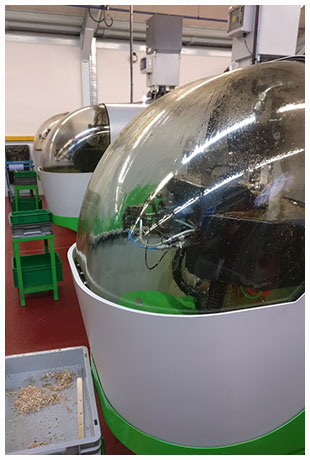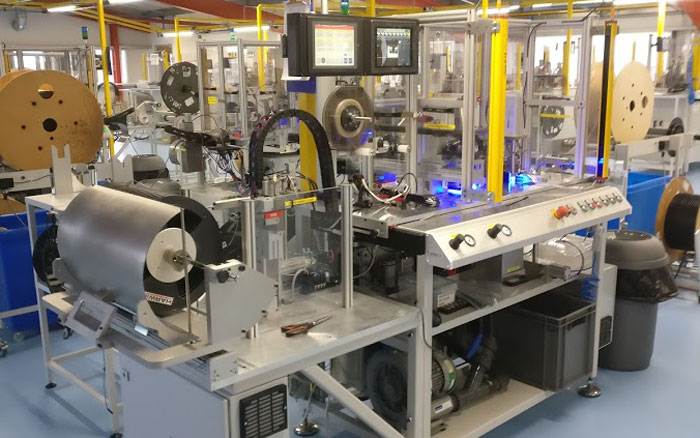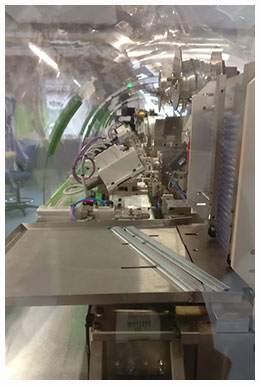In-house manufacturing shaping the future for UK company
A privately owned family business, Harwin, was founded back in 1952 by Patrick De Lazlo and his family. Now his son Damon is the CEO of the connectors company, and this year Harwin has been awarded EN 9100 certification. The high reliability (Hi-Rel) connector manufacturer has demonstrated a commitment to the aerospace industry which has been recognised through its supply chain excellence.
Authors: Anna Flockett and Alice Matthews.
This can be seen at Harwin’s factory and headquarters in Portsmouth, where the bulk of the manufacturing takes place, as the company aims to maintain a high degree of investment back into new equipment. The ethos of the company is not to generate cash for the owner; it is to generate a future for the business.
The machine replacement life cycle runs for a maximum of five years, as integral to the company’s structure, is staying at the forefront of technology so that its equipment or processes do not become redundant and obsolete. This means the company is in a good position in terms of automation and new product development because they always have the latest equipment. Ben Green, Head of Business, Marketing and Communications at Harwin stated that they are lucky enough to be “masters of our own destiny when it comes to product development.”
The company employs around 150 workers on-site, which are trained to work in the highly automated environment of the Harwin factory. The staff here can set up machines, leave them to work over a long period of time and ensure that nothing goes wrong.
Harwin has many facilities across the world, including another facility in Salium, New Hampshire, that in the last year has been repurposed to now perform cable assembly. Green continued: “Most customers want to buy from distribution and less and less from direct sales, so we have retrained our staff to IPC620 standard (crimping) which has added service and value to customers – this makes it easier for them, and we can also offer prototype quantities.”
Last year a new £3m factory was built at the Portsmouth site, and the company is spending this year filling it with new equipment. Green added: “Over ten percent of turnover goes into research and development, (a bit over this year), but there has been pretty strong growth, so the company is keen to invest.”
Green explained the company is able to stay more competitive and manufacture in the UK, as back in 2001, there was a change in management and the CEO Damon De Laszlo become more involved, and had a commitment to maintain manufacturing in the UK. “Damon’s philosophy is that ‘we need to have a manufacturing economy, we can’t just rely on goods and services.’”
Around ten percent of the staff are part of an apprenticeship programme. Harwin encourages young engineers from local schools that show an interest in the manufacturing disciplines present at Harwin. Some of the younger members of staff who now have roles such as Product Strategy Managers, originally came through apprenticeships with just a BTEC, and now travel around the world.
One issue Harwin is always thinking about is ‘are there enough people interested in engineering?’ Green commented: “We have to look hard, the guys that we take on have probably known from a young age that they’re interested in science and maths. But it’s definitely a smaller pool of people.”
However, when companies do go into schools, find students to enrol on work experience, and keep track of their progress – they find some of the best workers. It’s quite often about trying to ‘catch’ them from a young age and maintain lines of communication. Harwin have to train people, so the best way is to bring them in young.
Another arguably taboo subject in the industry is the lack of female apprentices, as the industry tends to be biased towards men on design/engineering sides. There are female engineers out there, the situation is just the same as it is for young males, in that you have to look hard to find them and help them along with their interests and passions.
There are not as many females coming through, even at a young age, but this is something that needs to be tackled at schools through educating children about the industry and opportunities at a more detailed level. Harwin is trying to do more work in schools, but the benefit of this won’t be visible for another 10-15 years.
Harwin also does a lot of work with local training organisations including PETA (Portsmouth) and SETA (Southampton), and some students come through the BTEC route, in which Harwin fund them to take the courses they need at Portsmouth University whilst they work and learn in the factory.
Green commented: “Apprentice programmes are a good method of on the job training, as it means you’ve got much more experience. This is the route Harwin take and I would recommend it to my kids, if you can find a company that supports it.”
Harwin’s business is divided into three main areas: industrial board to board interconnect products, Hi-Rel connectors and PCB hardware and EMC shielding.

In regards to the industrial connectors, these are targeted for factory automation use and are manufactured in bulk. One of the biggest challenges that Harwin faces is how to remain price competitive against Asian manufacturers. Green highlighted that it is the guarantee of Harwin quality – its “local presence” distinguishes their products from their competitors, but also appreciated that for those who require simply a very low price it may be more financially viable to purchase from China.
Harwin works closely with key distribution partners TTI, Mouser and Digi-Key. These distributors take the small orders because they have the logistics to do so. As a result of this large amount of stock in the network, lead times are low and Harwin’s products are sold in over 100 countries.
 One of the unique aspects of Harwin’s business is its range of Hi-Rel, patented, avionics grade connectors. The company launched Gecko, the smallest (1.25mm pitch) Hi-Rel connectors available on the market, in 2012. Targeted at small satellite and avionics applications, the Gecko connectors are precision-turned at Harwin’s Portsmouth headquarters.
One of the unique aspects of Harwin’s business is its range of Hi-Rel, patented, avionics grade connectors. The company launched Gecko, the smallest (1.25mm pitch) Hi-Rel connectors available on the market, in 2012. Targeted at small satellite and avionics applications, the Gecko connectors are precision-turned at Harwin’s Portsmouth headquarters.
Harwin has also introduced the M300 series of Hi-Rel connectors which focus on getting more power, rather than achieving a tiny size. The company is now looking to launch mid-range connectors which balance the space saving and high power features of Gecko and the M300 series.
The final third of Harwin’s business is its range of PCB hardware predominately – but not exclusively - for EMC shielding. It has been manufacturing surface mount, stamped components in-house for 15-20 years and these have taken off in the past five years. The company entered the shield can market, providing a cable clip system which saves a huge amount of assembly time and prevents hand-soldering. Harwin now manufacturers a range of cans and even offers a prototype, pre-scored version which enables customers to make their own cans. This allows a designer to test a concept quickly and cheaply.
Harwin has witnessed growth in avionics, medical and power control applications in recent years. Throughout the course of the year, the company will launch a new product at every trade show it attends. With collaborations with Autosport and space companies increasing, Harwin is certainly a company to look out for in 2017.











